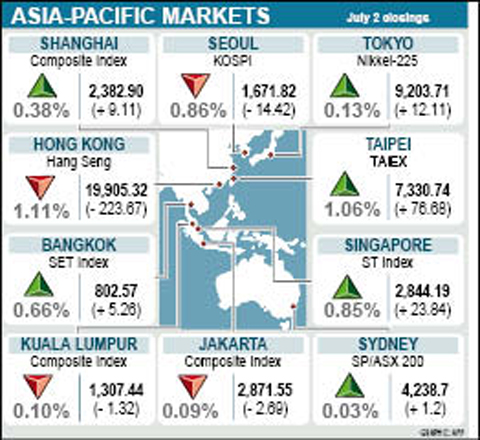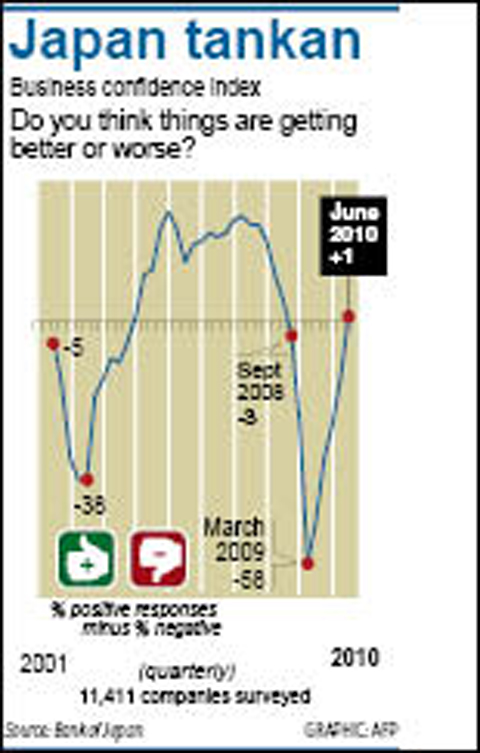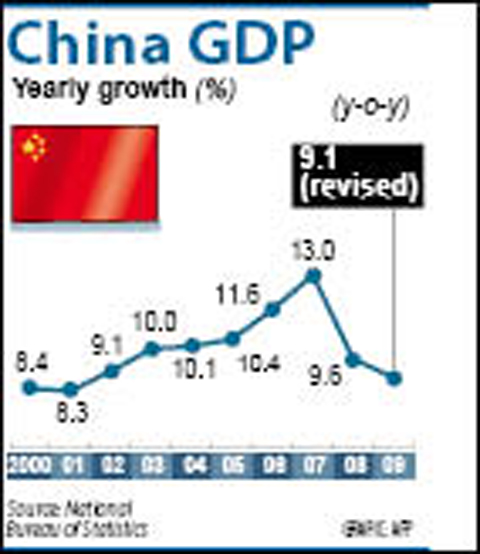Asian stocks fell, dragging the MSCI Asia-Pacific Index to its fourth weekly decline in five, as weaker manufacturing growth in the US, Europe and China added to signs global economic recovery is faltering.
The MSCI Asia-Pacific Index fell 3.4 percent to 111.70. The gauge has slumped 7.3 percent this year amid concerns Europe’s debt crisis and Chinese steps to curb property prices will hurt global growth.
The Shanghai Composite Index declined 6.7 percent, the biggest decline among benchmark indices in the Asia-Pacific after the New York-based Conference Board revised down an estimate for China’s growth and the country’s manufacturing expanded at a slower-than-expected pace.

China’s manufacturing growth slowed more than economists forecast last month, data released on Thursday showed. The Conference Board on June 29 corrected down its April gauge for China’s economic outlook due to a calculation error.
Goldman Sachs Group Inc on Friday cut its real GDP growth forecast for China this year to 10.1 percent from 11.4 percent, joining BNP Paribas, Macquarie Securities Ltd and China International Capital Corp in doing so.
Taiwan’s TAIEX closed up 1.05 percent on Friday on a technical rebound led by the financial sector, after a 3.3 percent fall posted in the previous three sessions amid concerns over the global economy, dealers said.

The TAIEX rose 76.68 points to 7,330.74, after moving between 7,285.01 and 7,378.77.
Hong Kong’s Hang Seng Index slipped 3.8 percent. Foxconn International Holdings Ltd (富士康控股), the world’s biggest contract maker of mobile phones, tumbled 13.3 percent after predicting a wider first-half loss.
Foxconn, controlled by Taiwan’s Hon Hai Precision Industry Co (鴻海精密), slumped 13.3 percent to HK$4.88, the third-biggest decline on the MSCI Asia-Pacific Index. The company said on June 29 its first-half loss would widen in part because of lower prices for its products and higher depreciation expenses.

Japan’s Nikkei 225 Stock Average lost 5.5 percent, after the yen strengthened for a fourth week, dragging shares of Japanese exporters such as Canon Inc and Sony Corp lower.
Other markets on Friday:
Manila fell 0.73 percent, or 24.28 points, from Thursday to 3,290.98, following Wall Street.
Wellington closed up 0.15 percent from Thursday in its first gain in seven trading days, although the mood remained cautious.
New Zealand’s benchmark NZX-50 index rose 4.29 points to 2,938.11.
Jakarta lost 2.69 points, or 0.09 percent, from Thursday to 2,871.55 as foreign funds sold select consumer and financial stocks after higher-than-expected inflation data for last month raised fears of a rate hike.
Mumbai fell 0.28 percent from Thursday as investors unwound positions ahead of the weekend, awaiting the US jobs data. The benchmark 30-share SENSEX index closed down 48.38 points at 17,460.95.

MORE VISITORS: The Tourism Administration said that it is seeing positive prospects in its efforts to expand the tourism market in North America and Europe Taiwan has been ranked as the cheapest place in the world to travel to this year, based on a list recommended by NerdWallet. The San Francisco-based personal finance company said that Taiwan topped the list of 16 nations it chose for budget travelers because US tourists do not need visas and travelers can easily have a good meal for less than US$10. A bus ride in Taipei costs just under US$0.50, while subway rides start at US$0.60, the firm said, adding that public transportation in Taiwan is easy to navigate. The firm also called Taiwan a “food lover’s paradise,” citing inexpensive breakfast stalls

TRADE: A mandatory declaration of origin for manufactured goods bound for the US is to take effect on May 7 to block China from exploiting Taiwan’s trade channels All products manufactured in Taiwan and exported to the US must include a signed declaration of origin starting on May 7, the Bureau of Foreign Trade announced yesterday. US President Donald Trump on April 2 imposed a 32 percent tariff on imports from Taiwan, but one week later announced a 90-day pause on its implementation. However, a universal 10 percent tariff was immediately applied to most imports from around the world. On April 12, the Trump administration further exempted computers, smartphones and semiconductors from the new tariffs. In response, President William Lai’s (賴清德) administration has introduced a series of countermeasures to support affected

CROSS-STRAIT: The vast majority of Taiwanese support maintaining the ‘status quo,’ while concern is rising about Beijing’s influence operations More than eight out of 10 Taiwanese reject Beijing’s “one country, two systems” framework for cross-strait relations, according to a survey released by the Mainland Affairs Council (MAC) on Thursday. The MAC’s latest quarterly survey found that 84.4 percent of respondents opposed Beijing’s “one country, two systems” formula for handling cross-strait relations — a figure consistent with past polling. Over the past three years, opposition to the framework has remained high, ranging from a low of 83.6 percent in April 2023 to a peak of 89.6 percent in April last year. In the most recent poll, 82.5 percent also rejected China’s

PLUGGING HOLES: The amendments would bring the legislation in line with systems found in other countries such as Japan and the US, Legislator Chen Kuan-ting said Democratic Progressive Party (DPP) Legislator Chen Kuan-ting (陳冠廷) has proposed amending national security legislation amid a spate of espionage cases. Potential gaps in security vetting procedures for personnel with access to sensitive information prompted him to propose the amendments, which would introduce changes to Article 14 of the Classified National Security Information Protection Act (國家機密保護法), Chen said yesterday. The proposal, which aims to enhance interagency vetting procedures and reduce the risk of classified information leaks, would establish a comprehensive security clearance system in Taiwan, he said. The amendment would require character and loyalty checks for civil servants and intelligence personnel prior to